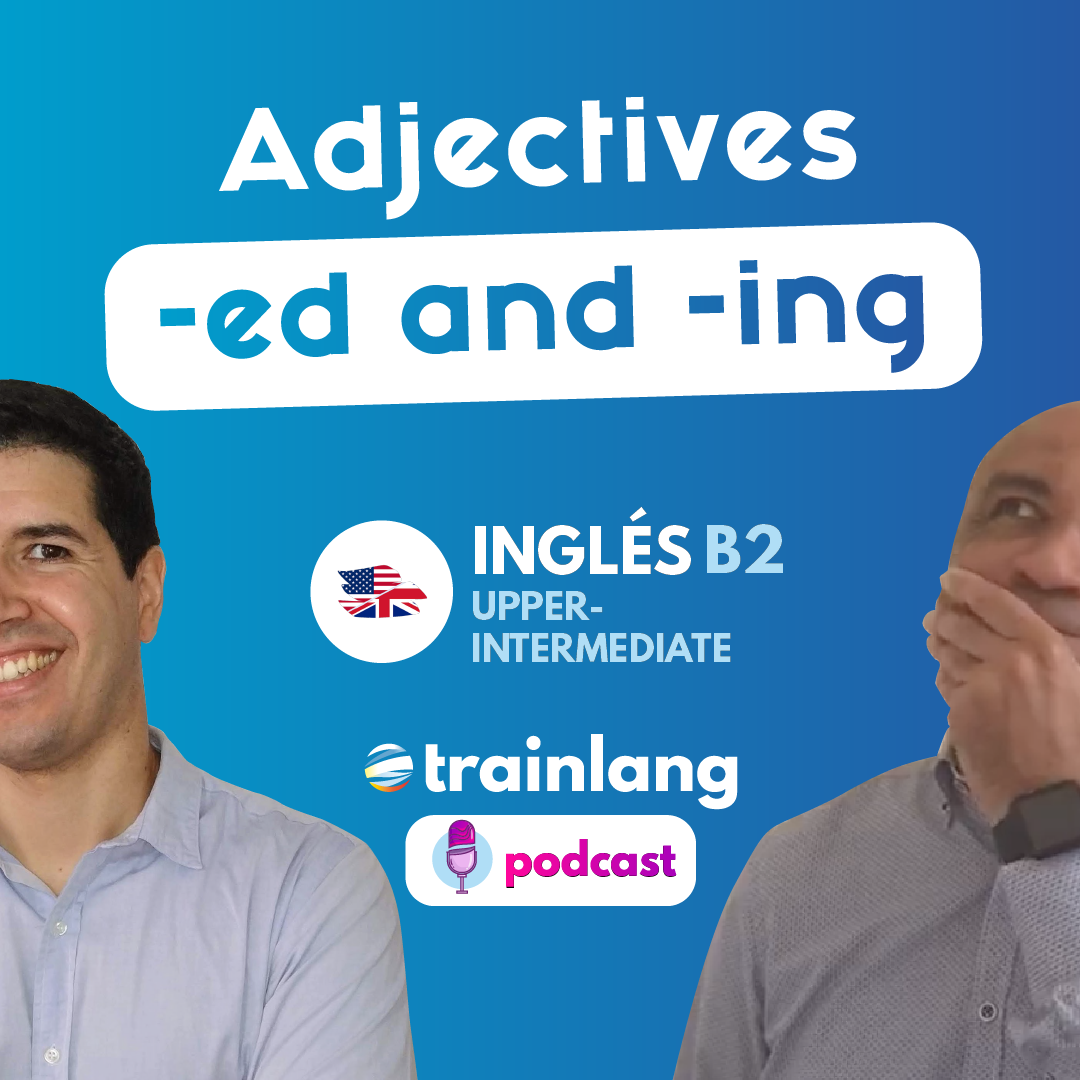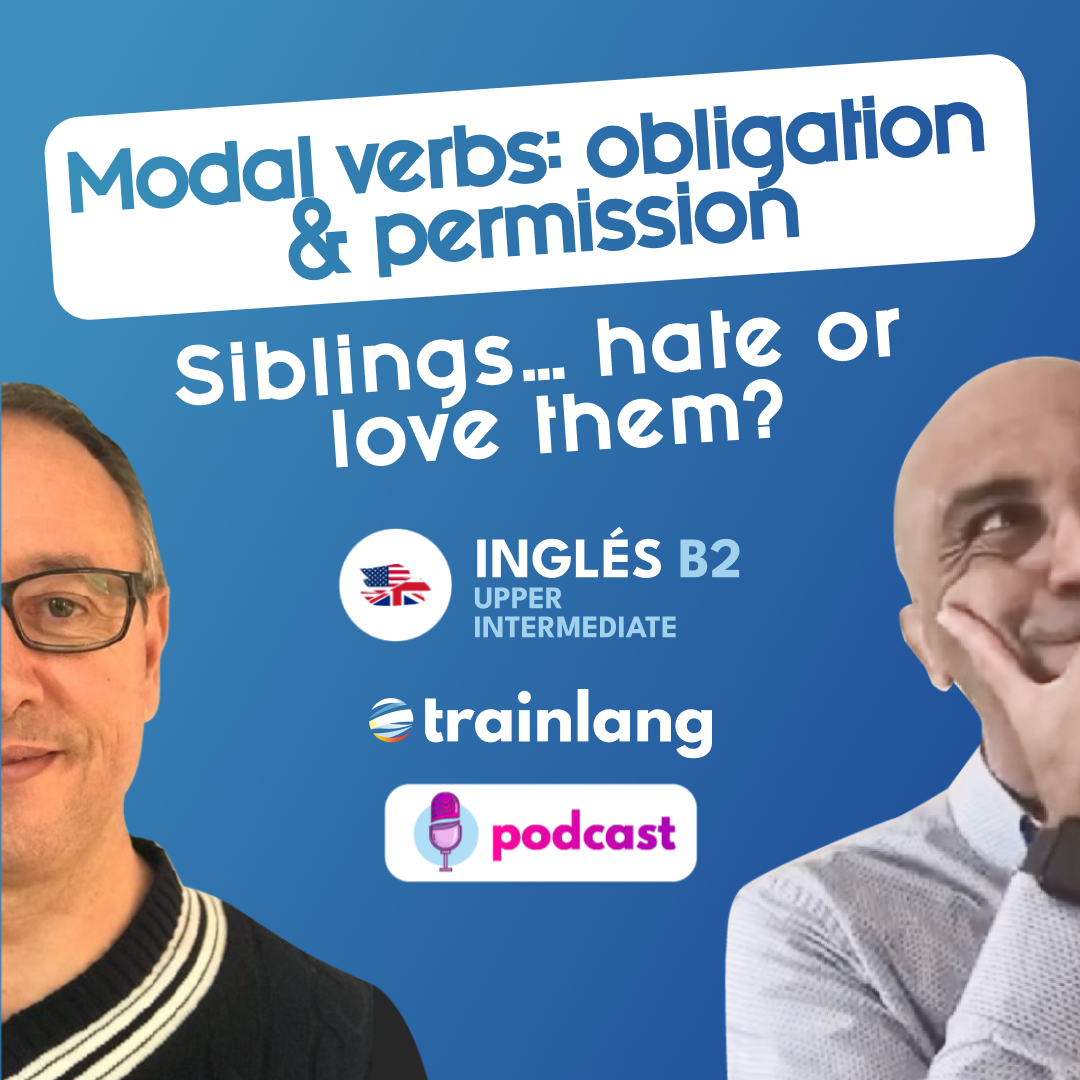Episode Transcript
[00:00:12] Speaker A: Hey, Stefan. Hello. Welcome to our Train Lang podcast. Good to see you again, Hans.
[00:00:17] Speaker B: Good to see you again. Also, we've just finished one podcast and now we're on to the second one today. You know what, Matthew? I can't think of any best way to start on Monday morning.
[00:00:28] Speaker A: Oh, Stefan, that's the reason I love working with you, my friend.
[00:00:33] Speaker B: I'm sure you tell that to everybody.
[00:00:36] Speaker A: Johnny, Sandy, Alene, you say that to all the potters. Oh, well, here we are, Stefan, and we, we're going to have a look at. This is an interesting subject today. I really, I really like this one. Could you tell the listeners what we're going to be talking about?
[00:00:53] Speaker B: Yes. We're going to be talking about the passive voice, and we're going to be comparing active voice, which is the first thing we learn when we learn a new language or English, and the passive voice. And we're going to be talking also about music.
Matthew, when do you listen to music? How do you listen to music?
[00:01:11] Speaker A: How do I listen to music? That's a good question, Stefan.
Yeah, it's changed a lot. Do you know what? I have to be honest with you. I'm listening more now to podcasts. I used to listen to music a lot. It was really important in the car, at home all the time. But now, I don't know, I, I, I listen more to podcasts.
[00:01:30] Speaker B: You're maturing, that's why.
[00:01:32] Speaker A: Oh, getting older.
[00:01:34] Speaker B: What about you?
Maturing? Oh.
[00:01:40] Speaker A: You sound to me like the kind of guy who has it on in the shower.
[00:01:44] Speaker B: No, you know what? The only time I put music on is when I'm driving.
[00:01:49] Speaker A: Really?
[00:01:49] Speaker B: I've, I've never been like my brother, for example. My brother used to, when we were teenagers, he used to have his Walkman that, his, that, that one that you put the CD inside, and he used to listen to music all the time.
Me, not so much. In fact, my wife says I don't like music. It's not true. I do like music, but I just listen to music when I'm in the car.
[00:02:12] Speaker A: Okay, okay. Maybe that car that's gone past the building a few times with the reggaeton on.
That's you?
[00:02:20] Speaker B: No, that's me.
[00:02:22] Speaker A: Oh, no, I'm with you. Okay, very good.
Okay, well, listen, let's get into this, but first of all, first of all, before I forget, bienvenidos a los podcasti train lang, Stefan. Bienvenido, amigo mio.
Apprende ingles con episodios desenados para Personas occupadas.
Minutos al dia.
The academias in Google. Prevalas gratis. Stefan Podcast.
Very good, Stefan. Okay, so listeners, please imagine the scene.
Imagine the scene. We're in a.
In a. In a coffee shop in Madrid.
Stefan has just ordered two espressos and we're gonna have a little discussion about music.
Okay, Are you ready?
[00:03:32] Speaker B: I'm ready.
[00:03:33] Speaker A: Let's do this.
Stefan, how's it going?
[00:03:38] Speaker B: Hi, Matthew. I'm good, thanks. I was just listening to some old rock music.
Did you know that the Beatles were formed in Liverpool?
[00:03:46] Speaker A: Yes. They're one of the most famous bands ever. Their music was loved by millions around the world.
[00:03:53] Speaker B: Good. Actually, before we continue, Matthew, let's just. I wanted to point out to our listeners if they can try and figure out where the passive voice is. What sentences are in the passive voice? Sorry to interrupt.
[00:04:06] Speaker A: No, no, that's good. We should have done that at the beginning. Very good. So, yeah, try to catch it.
[00:04:12] Speaker B: So I'll continue. Absolutely it. And it's amazing how their style changed over the years. Many of their songs were influenced by different varieties of music.
[00:04:23] Speaker A: I like that word, variety, Stefan.
[00:04:25] Speaker B: Huh?
[00:04:25] Speaker A: That's nice. Yeah, that's true. Did you know that sergeant Pepper's Lonely Hearts Club Band was considered one of the first concept albums?
[00:04:35] Speaker B: Yes, it was a revolutionary album. The way music was produced and recorded was completely changed by it.
[00:04:44] Speaker A: Speaking of influential bands, Queen was another band that changed the music scene. Bohemian Rhapsody was released in 1975 and it's still popular today.
[00:04:56] Speaker B: I love that song. And it's true. I love that song. It was played at my friend's wedding. Queen's music is timeless.
[00:05:02] Speaker A: Definitely. And did you know that David Bowie's Space Oddity was used by the BBC in its coverage of the moon landing?
[00:05:10] Speaker B: Really? That's interesting. His music was ahead of his time. He was known for his unique style and sound.
[00:05:17] Speaker A: Yes, Stefan, Bowie was a true innovator.
And let's not forget about the impact of punk rock.
One of your favorite bands, I think, Stefan. The Sex Pistols were banned from many places because of their controversial music.
[00:05:33] Speaker B: Yes, but the influence was undeniable. They changed the way people thought about music and rebellion.
Anyway, Matthew, I have to go now. I'm late for my Chinese lesson at Hangyu. But thanks for sharing all of this interesting information.
[00:05:47] Speaker A: You're welcome, Stefan. Don't forget to pay for these coffees before you leave. And if you ever want to listen to some more music or go to a concert, just let me know.
[00:05:57] Speaker B: I love that. We'll go together. See you later, Matthew.
[00:06:00] Speaker A: Goodbye.
Okay, Stefan, very good. Well, I think we had quite a few examples of the passive voice there. How many did you hear, listeners?
Well, before we continue, Stefan, I think you have an important announcement to make.
[00:06:17] Speaker B: Ah, yes, that's true. So podcasts, YouTube, LinkedIn, Twitch, like Matthew, you like Matthew Chinese school in English in train time.
[00:06:50] Speaker A: Fantastic. Okay, so let's talk about USO de la Vos Paciva. And I think we have five points for our listeners to have in mind when we. We use the passive voice. Stefan, do you want to get the ball rolling?
[00:07:05] Speaker B: Yes, I do.
So the way I explain it to my. To my students is like the.
Sorry.
[00:07:17] Speaker A: Okay, listeners, hold on, here we go.
[00:07:21] Speaker B: So the active voice is what the person does, what the subject does. Okay. And then the passive voice is what happens to the object.
So for example, I can say, Matthew teaches my nephew.
So he teaches. He is the one who teaches my nephew. But then if I want to say what happens to my nephew? So why is he so excited? Well, my nephew is taught by Matthew. So we say what happens to the object?
And. And why do we do this? So now I go back to what we were talking about.
[00:07:59] Speaker A: So let's grab hold of what you just did there, Stefan, because that's a really nice, simple example.
Matthew teaches my nephew. My nephew was taught or is taught by Matthew. Okay, so when we want to make the passive, I notice you're using the verb to be.
[00:08:18] Speaker B: Yes.
[00:08:19] Speaker A: And you're using it with the past participle. Right. Okay, fantastic. And essentially, is that what we need to have in mind when making the passive.
[00:08:28] Speaker B: Yes, but also is the verb to be that changes all the time. And this is what the students find difficult because the verb to be has to change to present simple. Am is. Are easy. Past simple, was, Were present continues. And many students say wait. The verb to be in present continuous. Yes. I am being nice. Or he is being rude. He is being.
Or for example, past perfect has been.
So it's the verb to be that changes to all the different tenses. And sometimes it's good to make a list of the grammar tense. Present simple. And then on the other side, the verb to be, am is R or past continuous. Was, being.
The verb to be can change to all of these.
[00:09:18] Speaker A: Yeah, it's flexible.
[00:09:20] Speaker B: Even model verbs, you can be, he can be promoted.
That's the passive voice.
But that's. That's the tricky part. That's the typical thing.
[00:09:32] Speaker A: Okay, okay. But that's good. That's nice. So we know. Then we have to Change the verb to be. And we need to have the participle of the main verb as well. And with those two ideas, I think we can move forward with this. So when are we going to use the passive? Let's go back to that first point.
[00:09:49] Speaker B: I hijacked the podcast.
So we use it when the. The person who does the action is unknown or not important.
So that's why I won't say, for example, the delivery. The pizza delivery guy is bringing my pizza to my house.
Obviously it's a. It's a person. It's a pizza delivery person, but I don't know who it is and it's not important. So then I would say my pizza is being delivered.
Or for example, they arrested Johnny. The police arrested Johnny. Obviously the police arrest.
I don't arrest. You don't arrest.
So because it's obvious and it's not important, we. Then we use the passive. Johnny was arrested last night.
[00:10:37] Speaker A: Very good, Stefan, thank you. Now, just for argument's sake, now we want to highlight who did the action.
It's obvious Johnny was arrested. It's got to be the police. No, but if I want to. To state that, how can I do it?
[00:10:52] Speaker B: We add by, so Johnny was arrested by the police.
Or even. Even when we don't know who it is. For example, my bike was stolen, I can say by someone.
[00:11:08] Speaker A: Right.
[00:11:08] Speaker B: By my neighbor.
[00:11:11] Speaker A: Do you know that there's been a lot of accusations from you on these last two podcasts against fellow teachers? I don't know what's biting you today. Yeah, but Johnny's boring and Alene's a thief. Stay tuned next week, listeners, to find out more about Santi.
Okay, good. They're good examples. Stefan, thank you very much. Now, Stefan, also, we use the passive in. In more formal situations if we want to.
I don't know, in Spanish, ser mass educados.
In English, to be more formal or polite. Maybe we can speak because if we use the passive, it also is a way of not drawing attention to ourselves.
Can be a way of speaking where we're not focusing the spotlight on what we've done. No. Okay, good. And is there any other instance, Stefan, we can mention for using the passive?
[00:12:09] Speaker B: Yes. For example, exams, B2 exams, English exams. When you. When we do our writing in our English exams, if we do the whole writing in Present simple, even though it's perfect, we will lose points, marks there. So it's important to add the passive.
The passive is an easy way to show that we can do more, that we can express ourselves better in English. It's an easy way to get points, extra points.
[00:12:39] Speaker A: That's a great tip. Thank you, Stefan. So keep that in mind, listeners, please. I think we've already talked a little bit about the structure of how to make the passive. So let's go back to the dialogue that we started with the music. How many examples of the passive did you hear in our conversation? Well, let's pick out a few and have a look at them. Stefan, do you want to go first?
[00:13:00] Speaker B: Yes. So you said the Beatles, Wolf. No, I said the Beatles were formed in Liverpool. So they were formed in Liverpool. So this is the passive because we say what happens to them?
Now a fun activity is to change the passives to actives and maybe we can give our listeners a few seconds. So how can they change this sentence? The Beatles were formed in Liverpool.
How about we give them 10 seconds?
[00:13:29] Speaker A: Okay. Okay. The Beatles were formed in Liverpool.
[00:13:35] Speaker B: Okay? And the answer is we don't know the person. So we say, someone formed the Beatles in Liverpool.
[00:13:42] Speaker A: Great.
[00:13:43] Speaker B: Someone formed the Beatles in Liverpool. Obviously we don't know who and it's not important. The important here, the important thing is they were formed in Liverpool.
[00:13:53] Speaker A: Great, Stefan, thank you. That's good. I like that. Okay, number two. And I. I don't remember whether this was me or you that said it. Huh?
The active phrase was millions of people loved their music around the world.
Okay. Millions of people loved their music around the world.
The passive way of saying that. Well, listeners, how would you do that? How would you change. Millions of people love their music around the world.
Okay? So the passive, their music was loved by millions around the world.
Now why would we do that? Well, we want to focus on the fact that the music was love. The music was so good. And by using the passive structure there, the music gets. Gets the first place. No, their music was loved by millions around the world. Perfect. Stefan, any more examples from our dialogue?
[00:14:53] Speaker B: Yes, I would like to do this last one. So the active sentence would be Queen released Bohemian Rhapsody in 1975.
So Queen released Bohemian Rhapsody in 1975. So the first thing to do is find the object, what is the object?
And the object of this sentence will give you some time to think is Bohemian Rhapsody. So we start with the object. We. Now we are going to say what happened to this?
To this, to this object, this song? And then the next thing we need to think about is what tense is it? Is it Queen released? So this is past simple. So then we use the verb to be in past simple. So Bohemian Rhapsody was released in 1975.
So sometimes to structure it like that, if I want to try, if they want to try at home, think of what is the object, what is the tense. Change the verb to be to that tense. And then past participle. Well, release is a regular verb, so we just have ed.
[00:16:03] Speaker A: Okay, Stefan, that's great. Thank you. Those steps can help us to put it together.
Very nice. Okay, I don't think we have much more time to go through extra examples, but a quick recap.
How do we make the passive voice? We need two things, don't we? Two main ingredients, the verb to be and the participle of the main verb. But, Stefan, you mentioned an important point that can be tricky when it comes to the verb to be.
[00:16:32] Speaker B: The verb to be has to change to the tense, and it can change to past, simple, past, continuous, past perfect, present, perfect, present perfect, simple, continuous. It can change to all of them model verbs.
And it's just practicing changing the verb to be, am, is, are, was, where has been, is, being, was, being, were, being can be.
The verb to be changes to all of those.
[00:17:03] Speaker A: Very good. Thanks, Stefan. So that's. That's something for us to keep in mind if you want to practice more about the passive voice, if you've got other questions or you just want to improve your English. Stefan, what can the listeners do?
[00:17:16] Speaker B: So they have to go to www.trainlang.com. the first lesson is free. And in this first lesson, you will learn to what the system is, the campus, how it works, why we are so successful teaching our students, why our students love learning English with us. And from there on, we will just adapt to the students. We adapt to people who want to learn English for business, who want to learn English to pass an exam just for school, just as a hobby. We adapt to everybody.
[00:17:52] Speaker A: Fantastic, Stefan. Well, we can't close the podcast without hearing your favorite.
Your favorite rock song of all time stuff. Come on, the listeners.
[00:18:02] Speaker B: I think. I think it's.
No. Was it.
I remember the name now.
It's from Queen. The song is from Queen. Don't stop me now.
[00:18:13] Speaker A: Don't stop me now.
Sadly, we're gonna have to, because that's the end of the podcast. Stefan, thank you very much. It's been a pleasure.
[00:18:22] Speaker B: And you. Take care, everybody. Bye bye, master.
[00:18:24] Speaker A: Take care, everybody. Goodbye.


